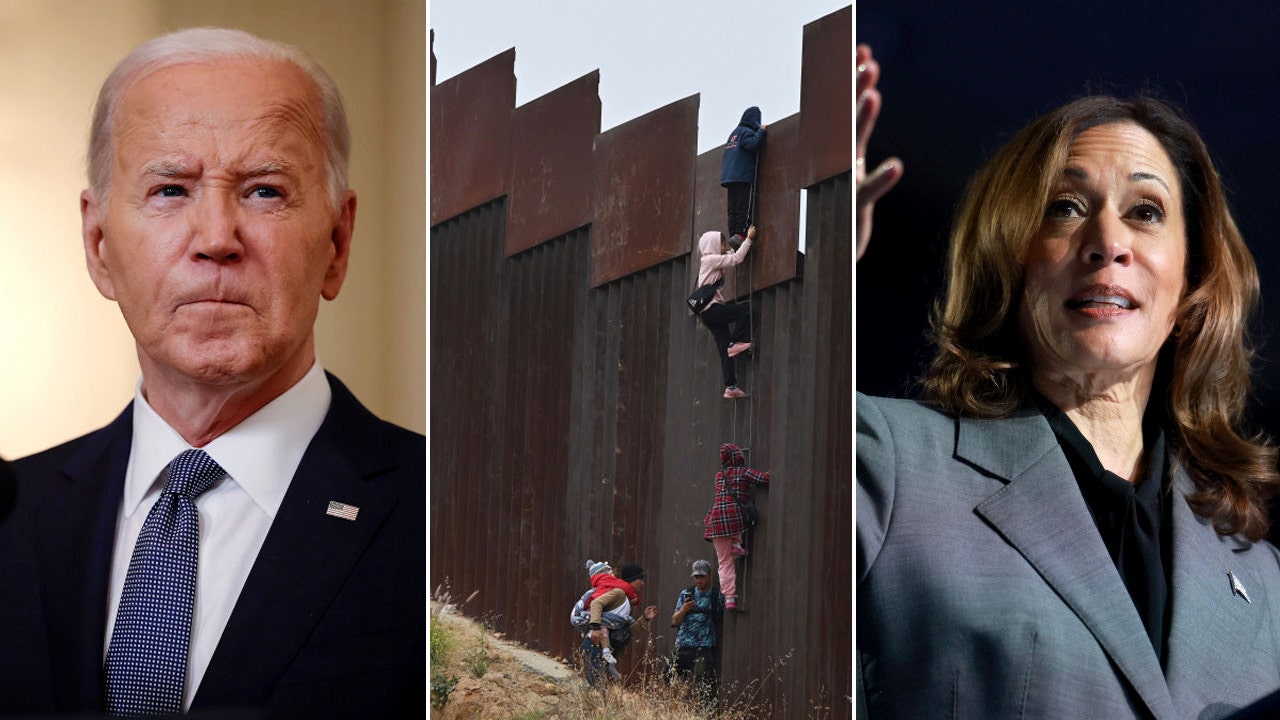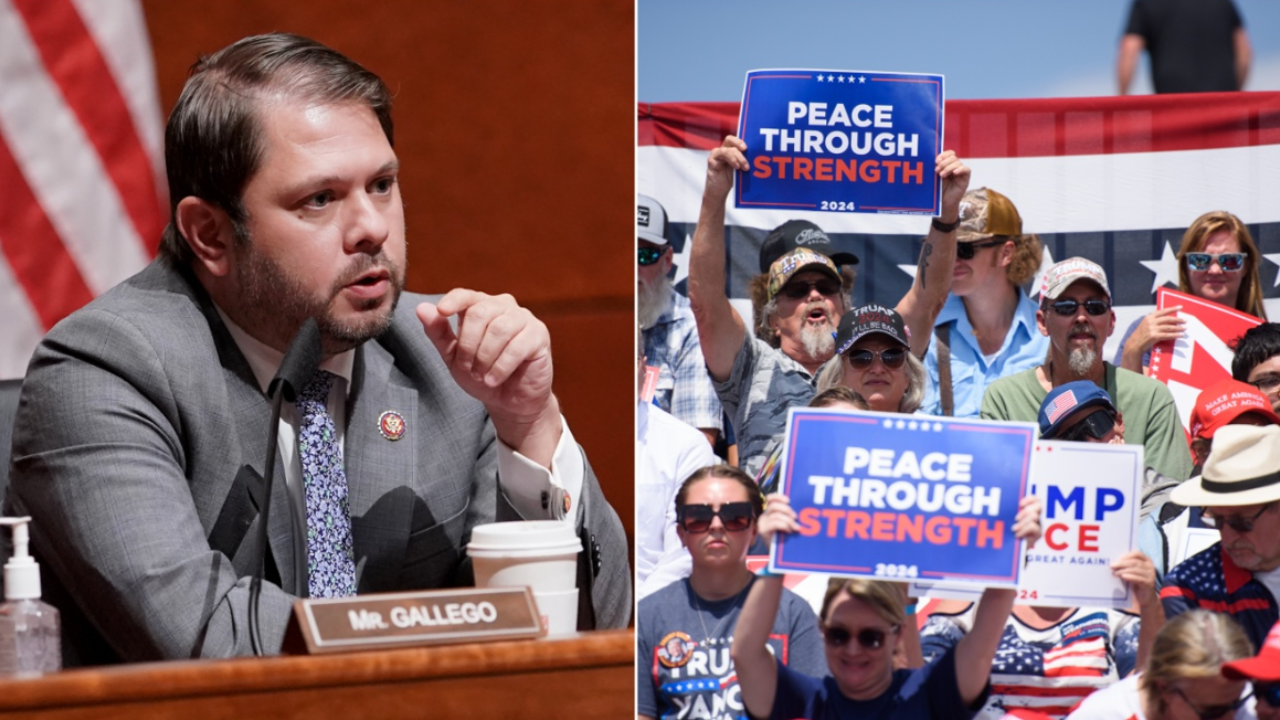World
US elections 2024: Who is the Republican contender Ron DeSantis?

Washington, DC – In a 2018 campaign ad when he was running for governor of Florida, Ron DeSantis tells his daughter — a toddler — to “build the wall” as she puts together boxes that resemble bricks.
The structure was a reference to then-President Donald Trump’s promise to build a border wall between the United States and Mexico as part of an aggressive platform to stem irregular migration.
Endorsed by the Republican president at that time, DeSantis would fully embrace Trumpism and go on to win the Florida governorship in a tightly contested and closely watched race.
Now he wants to replace Trump as the standard-bearer of the Republican Party.
DeSantis filed paperwork confirming his candidacy for president on Wednesday, throwing his hat in the ring alongside a growing list of hopefuls challenging Trump for the 2024 Republican nomination. He is widely seen as the former president’s most serious primary rival.
The Florida governor has been making headlines by enacting right-wing policies on a wide range of social issues — infuriating liberals, earning the praise of conservatives and cementing his prominent status and name recognition in US politics.
“There has always been space within the Republican Party for someone who is not Trump,” said Seth Masket, director of the Center on American Politics at the University of Denver.
“DeSantis was kind of a natural, at least early on, for that position simply because of how well-known he has been among Republicans.”
Who is Ron DeSantis?
DeSantis, who was comfortably re-elected last year, is one of more than two dozen Republican governors.
Yet, analysts say he has distinguished himself by taking on what he calls left-wing “wokeism”, staunchly opposing COVID-19 restrictions and successfully moving his agenda forward with the help of a willing majority in the Florida legislature.
A graduate of Yale University and Harvard Law School, a military veteran and a former Congress member, DeSantis has amassed a resume that checks many boxes for a presidential candidate.
But he made his name nationally in 2018 when he first won the Florida governorship, emerging from a crowded field of Republican candidates to snag a triumph in the tightly contested state. During the race, he frequently appeared on Fox News to defend Trump, making himself known to the network’s conservative viewers along the way.
More recently, in 2022, DeSantis sailed to re-election with historic margins not seen since 1982. His decisive victory helped strengthen Florida’s status as an increasingly red state.
As governor, he championed conservative causes, especially in the education system, where he signed bills to limit discussions of gender and sexuality in schools and block funding for diversity programmes at universities.
The more DeSantis attracted the spotlight with his conservative approach, the more he was attacked by Democrats — a dynamic the governor welcomed, according to Masket.
“People in conservative circles were cheering him on, but also Democrats were noticing,” Masket told Al Jazeera. “And they started highlighting him as one of the major threats to democracy in the US. And that just egged him on. That was perfect for him. The fact that liberals hated him was – as far as he was concerned – another feather in his cap.”
COVID policy and immigration
Under his leadership in 2020, Florida was one of the first large states to roll back and then fully lift its COVID-19 lockdowns against the warnings of federal health officials at that time.
The following year, DeSantis pushed back against coronavirus vaccine mandates, again advancing the right-wing cause of prioritising individual choice when it came to public health during the pandemic.
DeSantis also pushed for restrictions on abortion even before the US Supreme Court overturned the constitutional right to the procedure last year. And this year, he signed a six-week abortion ban into law.
Moreover, he waded into the immigration policy debate. Last year, DeSantis chartered flights to transport dozens of migrants and asylum seekers from Texas to Martha’s Vineyard, a wealthy community in the largely Democratic state of Massachusetts.
The migrants arrived without advance notice, local authorities said, sparking anger and questions from rights groups about the legality of the transfer. The White House condemned the incident at that time as cruel “political theatre”.
In short, DeSantis successfully translated his right-wing rhetoric into policy, analysts said.
“Whenever you’re different, whenever you break with your party, you’re out there on your own. And if there are no drastic consequences, then it can make you look like you’re ahead of the curve,” said David Ramsey, who teaches constitutional law and political philosophy at the University of West Florida.
He added that the governor helped rebuild the Republican Party in Florida, a traditional swing state that is now increasingly looking like a conservative stronghold.
“He’s put a lot of points on the board for his party,” Ramsey told Al Jazeera.
Trump vs DeSantis
Meanwhile, Trump, also a Florida resident, stands between DeSantis and the Republican presidential nomination, as they both seek to take on Democratic President Joe Biden in 2024.
Several other Republican candidates have launched presidential bids, but if public opinion polls are to be believed, the primaries will be a two-horse race between Trump and DeSantis.
With his combative attitude and unconventional policymaking, DeSantis evokes comparisons with Trump. But the governor can distinguish himself from the former president through his younger age, “more polished” style, military service and family life, political observers said.
DeSantis is 44 years old. Trump is 76. And unlike Trump, DeSantis’s personal life has been largely free of scandals.
“He contrasts well with the previous president. He’s young. He’s on his first wife. He actually served in the military,” said Gregory Koger, a political science professor at the University of Miami.
After the Republicans’ lackluster performances in the 2022 midterm elections, which were largely blamed on Trump, many thought DeSantis would become the unofficial captain of the party.
“I think the question is: Who is the current leader of the Republican Party? Oh, I know who it is: Ron DeSantis,” Republican Senator Cynthia Lummis said last November.
Trump surging
The governor, however, lost some momentum in 2023, with recent national polls showing him behind Trump by as many as 36 percentage points.
Koger outlined three reasons for that decline. First, he said, Trump is actively campaigning while DeSantis only launched his official campaign this week.
A second reason is that Trump has been incessantly attacking DeSantis on his Truth Social platform, and for the most part, the governor has stayed mum.
And then there’s the question of Trump’s indictment, the first for a former or current US president. In April, Trump was criminally charged in New York in relation to a hush-money payment to a porn star. Republicans, including DeSantis, almost unanimously defended Trump against the prosecution.
“A combination of voters feeling like he’s being attacked and Republican politicians coming out and criticising the indictment led to a boost for Trump,” Koger told Al Jazeera.
With the first caucus in Iowa months away and legal trouble mounting for Trump, DeSantis will be hoping to bounce back and close the gap, especially as he starts to officially campaign for the nomination.
Koger cited DeSantis’s fight with the Walt Disney Company to show how the governor aimed to consolidate power and intimidate critics.
DeSantis went on the offensive against Disney last year and tried to strip it of its status as a special tax district after the company’s leaders criticised a piece of Florida legislation dubbed the “Don’t Say Gay” bill by critics. The legislation aimed to restrict instructions on sexuality and gender identity in public schools.
The attack on Disney, which turned into a protracted legal and political battle, was a risky one. Disney is an iconic American company that is one of Florida’s largest employers.
“What kind of Florida politician picks a fight with Disney World in the state and a country where that’s a revered brand?” Koger asked. “But it makes sense if the purpose is really to scare any business or organisation that would stand up to him, to keep people from criticising what he’s doing and create a climate of fear.”
Ukraine
While DeSantis has demonstrated his right-wing credentials on domestic issues as governor, he has not engaged in many discussions on foreign policy.
But in March, he drew criticism from Democrats and some Republicans when he called the conflict in Ukraine a “territorial dispute”.
“While the US has many vital national interests, … becoming further entangled in a territorial dispute between Ukraine and Russia is not one of them,” DeSantis said in a statement to then-Fox News host Tucker Carlson, a staunch critic of US support to Ukraine.
“The Biden administration’s virtual ‘blank check’ funding of this conflict for ‘as long as it takes’, without any defined objectives or accountability, distracts from our country’s most pressing challenges,” the governor argued.
That position placed him closer to Trump’s stance on the conflict than to that of the mainstream Republican Party. Many GOP lawmakers, with the exception of a few vocal far-right members, have overwhelmingly voted in favour of providing billions of dollars in aid to Ukraine.
Masket, the University of Denver professor, said that siding with sceptics of US support for Ukraine did not go over well for DeSantis.
“I don’t think that did him any favours,” Masket told Al Jazeera. “My impression was that it would make more sense for DeSantis to come out strongly in favour of Ukraine because he’s not going to win over the Trump wing of the party.”
Israeli-Palestinian conflict
One foreign policy area where DeSantis made his views abundantly known is the Israeli-Palestinian conflict.
He has said the Palestinian West Bank is “disputed”, not occupied territory, a view that contradicts international law and numerous United Nations resolutions. When he was in Congress, DeSantis also pushed Trump early on to move the US embassy to Jerusalem.
Last month, the governor visited Israel and hit out at Biden’s criticism of the Israeli government’s judicial overhaul plan, saying the US should not “butt into” Israel’s affairs.
In 2019, he moved to penalise Airbnb for suspending its listings in illegal Israeli West Bank settlements, part of a campaign that pressured the lodging company to reverse its decision. He also threatened to divest from Ben & Jerry’s parent firm after the ice cream maker decided to end its operations in the West Bank.
Rasha Mubarak, a Palestinian-American organiser in Florida, said DeSantis’s policies have been “dangerous” not only for Palestinians but also for Americans’ free speech rights.
“He uses fear and false narrative when he is pushing anti-Black, anti-immigrant, anti-Palestinian, xenophobic legislation and rhetoric that bring out his base and his support,” Mubarak told Al Jazeera.
While in the US Navy, DeSantis served at the Guantanamo Bay detention facility, a prison widely decried by rights group that he has said should remain open. One former inmate accused the governor of being present while prison officials were force-feeding detainees during a hunger strike.
“He was watching me struggle. He was smiling and laughing with other officers as I screamed in pain,” Mansoor Adayfi wrote in a column for Al Jazeera earlier this year. DeSantis vehemently denies that account.

World
A far-right party is looking for a historic election win in Austria
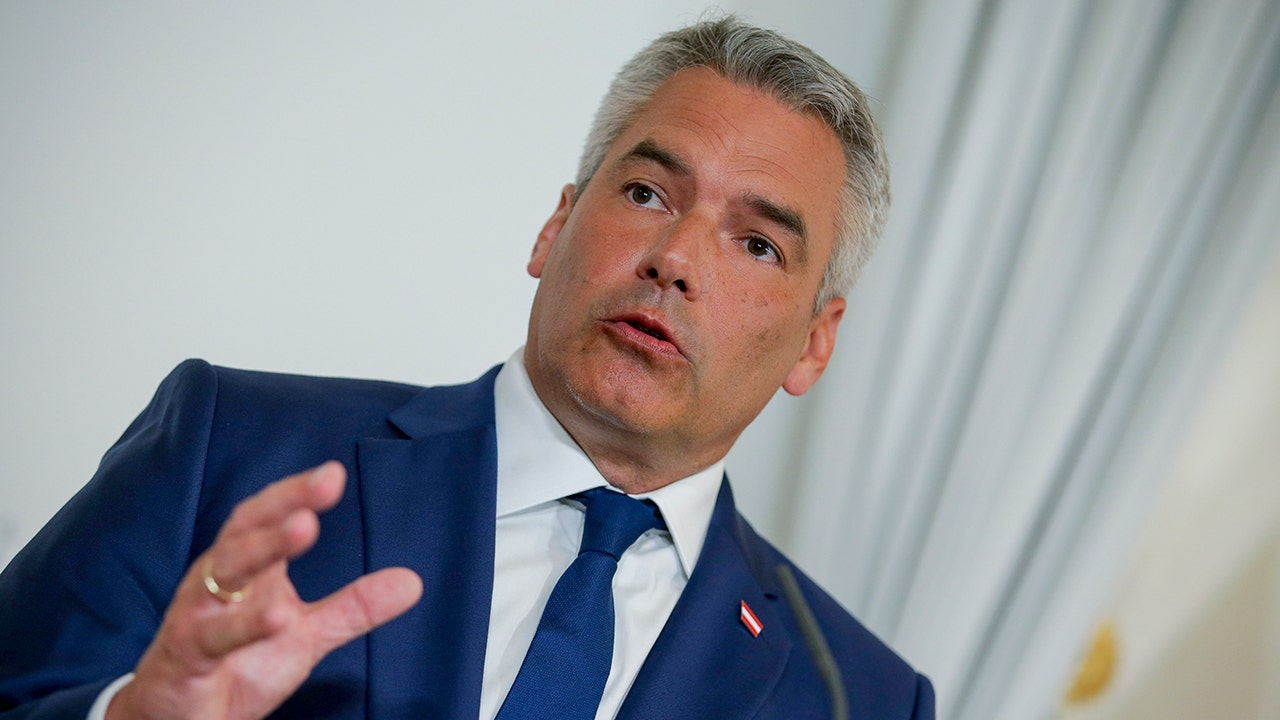
Austria’s far-right Freedom Party could win a national election for the first time when Austria votes on Sunday, tapping into voters’ anxieties about immigration, inflation, Ukraine and other concerns following recent gains for the hard right elsewhere in Europe.
Herbert Kickl, a former interior minister and longtime campaign strategist who has led the Freedom Party since 2021, wants to become Austria’s new chancellor. He has used the term “Volkskanzler,” or chancellor of the people, which was used by the Nazis to describe Adolf Hitler in the 1930s. Kickl has rejected the comparison.
CONSERVATIVE AUSTRIAN CHANCELLOR TO STAY IN COALITION WITH LEFT-WING GREENS DESPITE CONTROVERSIAL VOTE
But to achieve that, he would need a coalition partner to command a majority in the lower house of parliament.
And a win isn’t certain, with recent polls pointing to a close race. They have put support for the Freedom Party at 27%, with the conservative Austrian People’s Party of Chancellor Karl Nehammer on 25% and the center-left Social Democrats on 21%.
Austrian Chancellor Karl Nehammer attends a press conference in Vienna in August. (AP Photo/Heinz-Peter Bader)
Still, Kickl has achieved a turnaround since Austria’s last election in 2019. In June, the Freedom Party narrowly won a nationwide vote for the first time in the European Parliament election, which also brought gains for other European far-right parties.
In the 2019 election, its support slumped to 16.2% after a scandal brought down a government in which it was the junior coalition partner. Then-vice chancellor and Freedom Party leader Heinz-Christian Strache resigned following the publication of a secretly recorded video in which he appeared to offer favors to a purported Russian investor.
The far right has tapped into voter frustration over high inflation, the war in Ukraine and the COVID pandemic. It also been able to build on worries about migration.
“You don’t really feel safe in your own country anymore. But then you’re being branded as right-wing just because you think about safety of your own people, the kids and women,” Margot Sterner, 54, said at a Freedom Party campaign event this month.
In its election program, the Freedom Party calls for “remigration of uninvited foreigners,” and for achieving a more “homogeneous” nation by tightly controlling borders and suspending the right to asylum via an “emergency law.”
Gernot Bauer, a journalist with Austrian magazine Profil who recently co-published an investigative biography of the far-right leader, said that under Kickl’s leadership, the Freedom Party has moved “even further to the right,” as Kickl refuses to explicitly distance the party from the Identitarian Movement, a pan-European nationalist and far-right group.
Bauer describes Kickl’s rhetoric as “aggressive” and says some of his language is deliberately provocative.
The Freedom Party also calls for an end to sanctions against Russia, is highly critical of western military aid to Ukraine and wants to bow out of the European Sky Shield Initiative, a missile defense project launched by Germany.
The leader of the Social Democrats, a party that led many of Austria’s post-World War II governments, has positioned himself as the polar opposite to Kickl. Andreas Babler — who is also mayor of the town of Traiskirchen, home to the country’s biggest refugee reception center — has ruled out governing with the far right and labeled Kickl “a threat to democracy.”
While the Freedom Party has recovered, the popularity of Nehammer’s People’s Party, which currently leads a coalition government with the environmentalist Greens as junior partners, has declined since 2019.
During the election campaign, Nehammer portrayed his party, which has taken a tough line on immigration in recent years, as “the strong center” that will guarantee stability amid multiple crises.
But it is precisely these crises, ranging from the COVID-19 pandemic to Russia’s invasion of Ukraine and resulting rising energy prices, that have cost the conservatives support, said Peter Filzmaier, one of Austria’s leading political scientists.
Under their leadership, Austria has experienced high inflation averaging 4.2% over the past 12 months, surpassing the EU average.
The government also angered many Austrians in 2022 by becoming the first European country to introduce a coronavirus vaccine mandate, which was scrapped a few months later without ever being put into effect. And Nehammer is the third chancellor since the last election, taking office in 2021 after predecessor Sebastian Kurz — the winner in 2019 — quit politics amid a corruption investigation.
But the recent flooding caused by Storm Boris that hit Austria and other countries in Central Europe brought back the topic of the environment into the election debate and helped Nehammer slightly narrow the gap with the Freedom Party by presenting himself as a “crisis manager,” Filzmaier said.
The People’s Party is the far right’s only way into government.
Nehammer has repeatedly excluded joining a government led by Kickl, describing him as a “security risk” for the country, but hasn’t ruled out a coalition with the Freedom Party in and of itself, which would imply Kickl renouncing a position in government.
The likelihood of Kickl agreeing to such a deal if he wins the election is very low, Filzmaier said.
But should the People’s Party finish first, then a coalition between the People’s Party and the Freedom Party could happen, Filzmaier said. The most probable alternative would be a three-way alliance between the People’s Party, the Social Democrats and most likely the liberal Neos.
World
Pope meets homeless and undocumented in Brussels
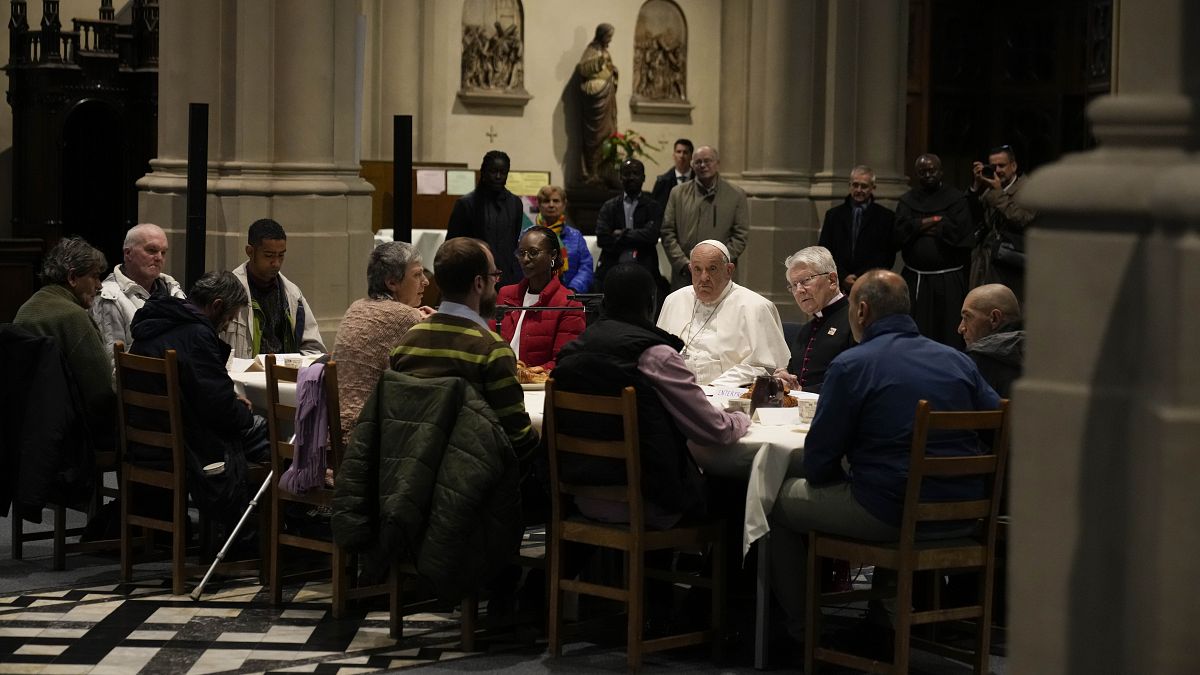
As part of his trip to Belgium, Pope Francis made a surprise visit to Saint Gilles where he met with homeless and undocumented people.
In a surprise change to his schedule, Pope Francis met with homeless and undocumented people in Brussels’ church of Saint-Gilles on Saturday morning. He learned about their lives over croissants and coffee.
10 people gathered around a table at the church of Saint Gilles in the centre of the city where they usually receive their breakfast outside.
The table was moved into the church to escape the rain. The group chatted with Pope Francis about their experiences and challenges.
They got a laugh from the pope when they gave him a gift of beer made by the parish to raise funds for charity, four bottles of La Biche de Saint Gilles.
Among the group was a migrant who made his way on a boat across the Mediterranean to the Italian island of Lampedusa and then was thrown in prison.
He told the Pope he lost his will to pray. He has now found his faith again.
Father Benjamin Kabongo, a Franciscan friar who works with the homeless at Saint Gilles, said it was a very strong gesture for the pope to come and listen to these people that the world does not pay attention to.
Shortly after, he left for the Koekelberg Basilica of the Sacred Heart, where he addressed local bishops, priests and the Catholic community.
People read out letters in which they challenged the Pope and shared questions on various aspects of the Catholic church.
Responding to criticisms
Just a day earlier, Francis also received public criticisms from the Belgian king, prime minister and the rector of the Catholic university in Leuven.
The criticisms included the church’s cover-up of clergy sexual abuse to its refusal to respond to demands of women and LGBTQ+ Catholics for a place in the church.
Francis met with the people most harmed by the Catholic Church in Belgium — the men and women who were raped and molested by priests as children and the single mothers who were forced to give up their newborns for adoption to avoid the stigma of raising them out of wedlock.
Luc Sels, the rector of Leuven Catholic University, told the pope that the abuse scandals had so weakened the church’s moral authority that it would do well to reform, to the point of ordaining women as priests, if it wants to regain its relevance.
Through it all, Francis expressed his remorse, begged forgiveness and promised to do everything possible to make sure such abuses never occur again.
“This is our shame and humiliation,” he said in his first public remarks on Belgian soil.
Pope Francis is on a four day trip to Luxembourg and Belgium.
World
Iran's supreme leader calls on Muslims to assist Lebanon in confronting Israel

Iran’s Supreme Leader Ayatollah Ali Khamenei called on Muslims on Saturday “to stand by the people of Lebanon and the proud Hezbollah with whatever means they have and assist them in confronting the … wicked regime (of Israel).”
In a statement after the Israeli army said it had killed Hezbollah leader Hassan Nasrallah, Khamenei said: “The fate of this region will be determined by the forces of resistance, with Hezbollah at the forefront,” state media reported.
He has been transferred to a secure location inside the country with heightened security measures in place, two regional officials briefed by Tehran told Reuters.
The sources said Iran was in constant contact with Lebanon’s Hezbollah and other regional proxy groups to determine the next step after Israel announced that it had killed Hezbollah terror chief Hassan Nasrallah in a strike on south Beirut on Friday.
Nasrallah was killed alongside Hezbollah’s commander of the southern front, Ali Karaki, and a host of other senior Hezbollah members in a strike on Hezbollah’s military headquarters in the Lebanese capital.
Khameini in hiding: Decision comes after emergency meeting
On Friday, Khameini held an emergency meeting with top advisors in Tehran, as per the New York Times citing Iranian sources.
Iranian Foreign Minister Abbas Araqchi accused Israel of using several US “bunker buster” bombs to strike Beirut on Friday.
“Just this morning, the Israeli regime used several 5,000-pound bunker busters that had been gifted to them by the United States to hit residential areas in Beirut,” he told a UN Security Council meeting on the Middle East.
Further, US President Joe Biden directed the Pentagon to “assess and adjust as necessary US force posture” in the Middle East, according to the White House.
“He has also directed his team to ensure that US embassies in the region take all protective measures as appropriate,” a statement read. The White House said Biden was briefed “several times” on Friday about the Middle East. An official added that Vice President Kamala Harris was also briefed.
-

 News1 week ago
News1 week agoToplines: September 2024 Inquirer/Times/Siena Poll of Pennsylvania Registered Voters
-

 Business1 week ago
Business1 week agoVideo: Federal Reserve Cuts Interest Rates for the First Time in Four Years
-

 News7 days ago
News7 days agoVideo: Who Are the Black Swing Voters?
-

 Politics1 week ago
Politics1 week agoDem lawmakers push bill to restore funding to UN agency with alleged ties to Hamas: 'So necessary'
-
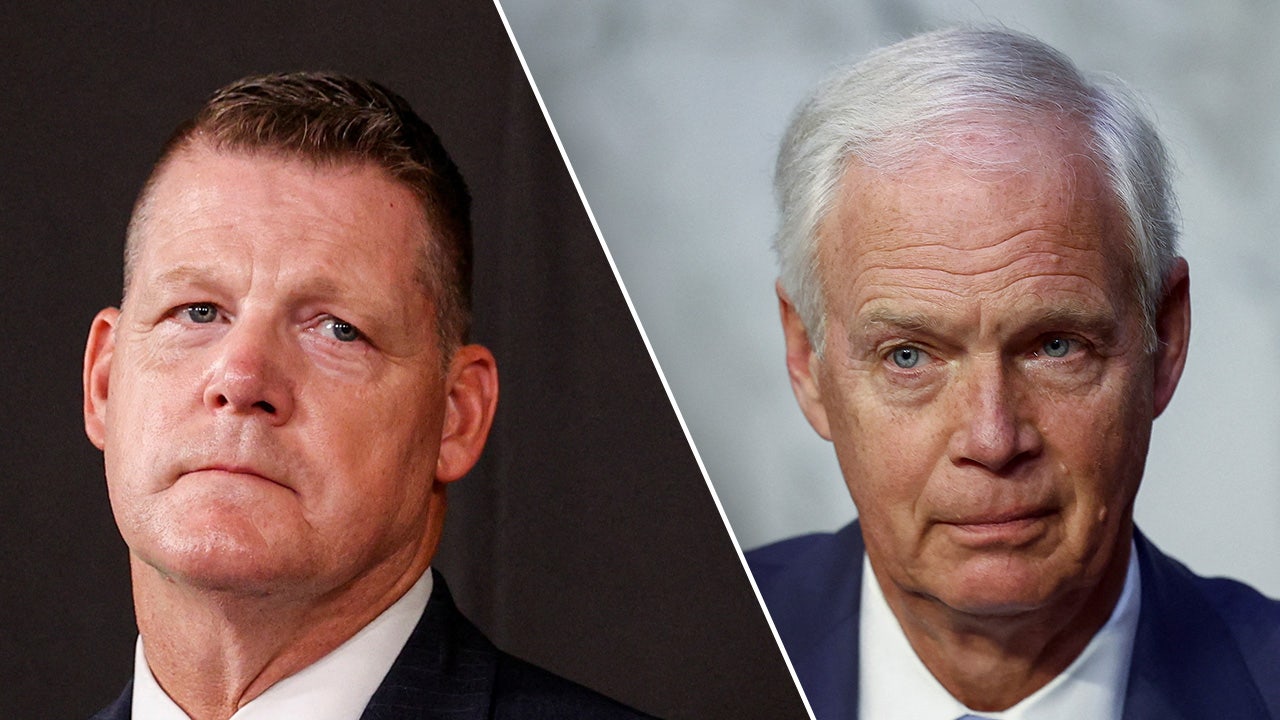
 Politics1 week ago
Politics1 week ago'I've never seen this': Top Republican details level of Secret Service 'lack of cooperation'
-

 News1 week ago
News1 week agoElection 2024 Polls: Florida
-
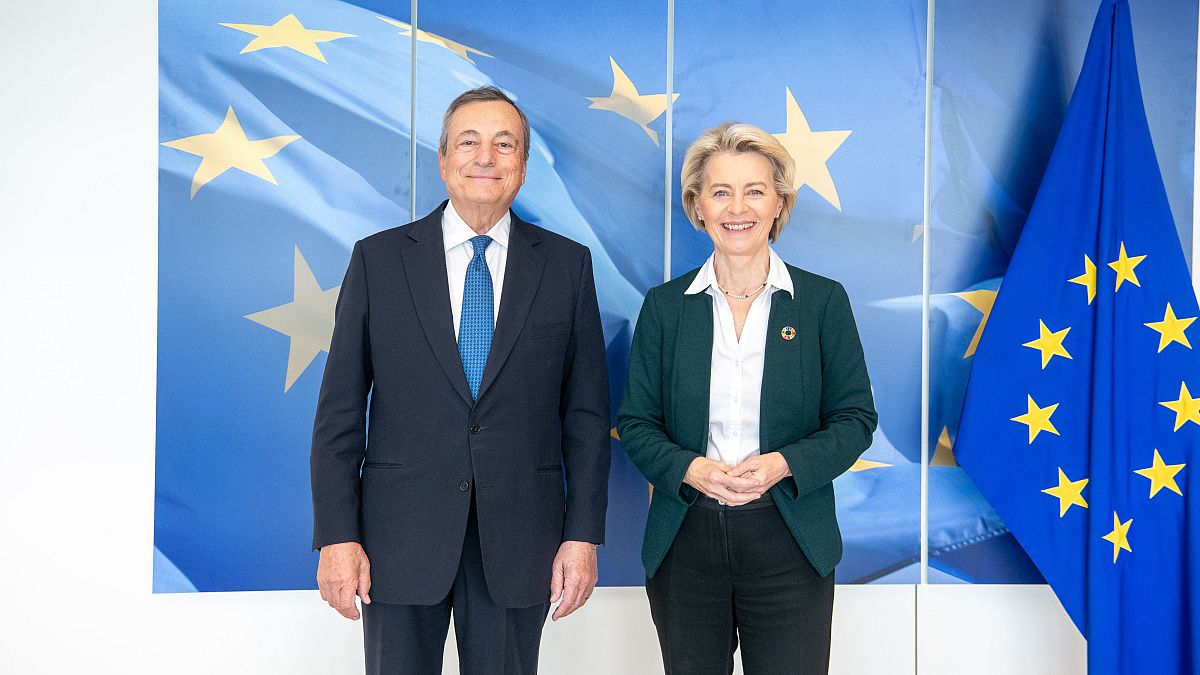
 World1 week ago
World1 week agoCritics slam landmark EU competitiveness report as 'one-sided'
-

 Finance1 week ago
Finance1 week agoThis ETF uses ChatGPT to invest like Warren Buffett









/cdn.vox-cdn.com/uploads/chorus_asset/file/25647892/81664127.jpg)





